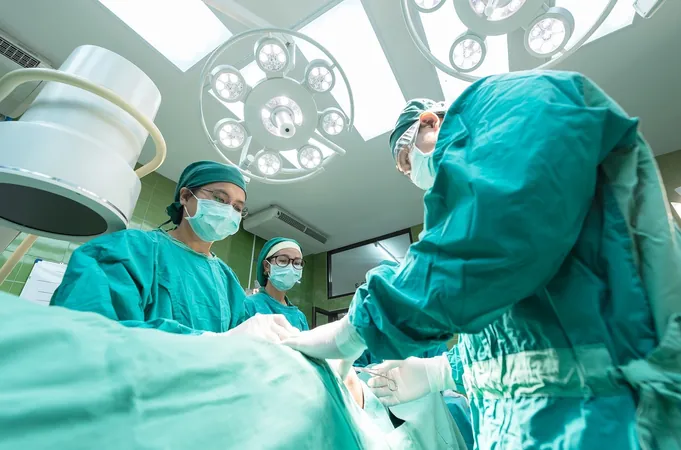
Revolutionary Algorithm Offers Hope for Liver Cancer Patients: Key Insights to Survival Rates!
2024-10-09
Author: Nur
Introduction
In a groundbreaking development, Dr. Marjorie Hoang, a Duke-NUS alumnus, in collaboration with her mentor, Professor Pierce Chow, has created an innovative algorithm that promises to transform how intermediate-stage liver cancer patients receive treatment and make decisions regarding their care. This new tool can significantly predict overall survival and recurrence-free survival rates following surgical interventions, addressing a crucial gap in current medical practices.
Dr. Hoang's Journey
Dr. Hoang's journey into hepatology began during her first year at Duke-NUS, where she realized the urgent need for advancements in liver cancer treatment, particularly in regions like Asia. “Knowing how prevalent hepatocellular carcinoma (HCC) is in Asia—especially in countries like Singapore and my homeland Vietnam—has fueled my passion for this field,” she expressed. Dr. Hoang aims to further her expertise by entering a General Surgery Residency and continuing her research endeavors.
Research Collaboration
Working under the mentorship of Professor Chow, a distinguished specialist in liver cancer surgery at the National Cancer Center Singapore, the duo sought to clarify which intermediate-stage liver cancer patients would benefit most from partial liver resections. Their significant findings have been published in the *International Journal of Surgery*.
The Need for Prognostic Tools
"Lack of accurate prognostic tools is a pressing challenge for both patients and healthcare professionals upon diagnosis of HCC," Professor Chow emphasized. Liver cancer ranks as the seventh most prevalent and fourth most lethal form of cancer globally, with a surprising concentration of cases in East and Southeast Asia. Notably, Vietnam has one of the highest liver cancer rates in the world, underscoring the urgency of this research.
Challenges in Diagnosis
Diagnosing liver cancer early remains notoriously difficult, with 80% of cases identified only in advanced stages. Those diagnosed earlier fall into two categories: individuals with early-stage cancer who have clear treatment options, and those with intermediate-stage cancer, where the best course of action remains ambiguous. This complexity is compounded by the introduction of advanced treatments like radiation and immunotherapy, making it even more challenging for patients and doctors to navigate their options.
Current Evaluation Methods
"For patients with early-stage HCC, clinicians often rely on the Milan criteria to evaluate eligibility for surgical resection," Dr. Hoang explained. Yet, a reliable model to predict survival post-resection for intermediate-stage patients has been lacking, leading to uncertainty in treatment planning.
Development of the Modified Metroticket Algorithm
To bridge this gap, Dr. Hoang and Professor Chow, along with their collaborators from Duke University Medical Center, adapted an established clinical calculator known as the Metroticket. Originally designed to forecast the prognosis of liver cancer patients undergoing transplants, the revamped calculator now targets those with intermediate-stage HCC to provide more precise insights.
Validation and Performance
The newly developed Modified Metroticket algorithm, validated against both local and international datasets, takes a variety of critical factors into account, including tumor burden, biological aggressiveness of the cancer, liver functionality, and patient age. Professor Chow noted that this predictive tool outperformed the conventional staging model currently endorsed by the American Joint Committee on Cancer in their Singapore-based cohort study.
Impact on Clinical Practice
Notably, the online availability of this algorithm empowers both physicians and patients with vital survival probabilities, potentially reshaping clinical practices and improving overall treatment decisions. As healthcare continues to advance, innovations like the Modified Metroticket shine a light on the complexities of liver cancer care, offering hope to countless patients navigating this formidable diagnosis.
Conclusion
Stay tuned as we continue to cover more breakthroughs in medical research that could change lives!



 Brasil (PT)
Brasil (PT)
 Canada (EN)
Canada (EN)
 Chile (ES)
Chile (ES)
 España (ES)
España (ES)
 France (FR)
France (FR)
 Hong Kong (EN)
Hong Kong (EN)
 Italia (IT)
Italia (IT)
 日本 (JA)
日本 (JA)
 Magyarország (HU)
Magyarország (HU)
 Norge (NO)
Norge (NO)
 Polska (PL)
Polska (PL)
 Schweiz (DE)
Schweiz (DE)
 Singapore (EN)
Singapore (EN)
 Sverige (SV)
Sverige (SV)
 Suomi (FI)
Suomi (FI)
 Türkiye (TR)
Türkiye (TR)